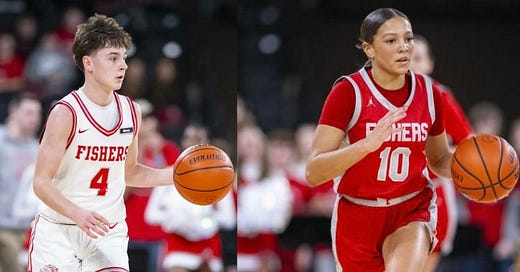There is something about the way they move—Riley and Cooper—that feels familiar. Not like déjà vu, but like something old returning. Something earned. Something that has lived a long, quiet life before being seen.
This isn’t the start of their story—just the point where recognition finally caught up to reality.
I sat down with both of them last year—before the circuit chatter, before the spring statlines started to circulate. What struck me wasn’t their talent. It was how quietly they carried it. How much they already understood that talent is only as useful as your relationship to work.
You could tell it in Riley’s response when asked how she stays confident under pressure. She didn’t deflect. She didn’t posture.
She said, with the certainty of someone who’s memorized her own rhythm:
“I’ve hit those shots before. I hit them in practice, in workouts, and I trust the work. So when I shoot, I’m not hoping—it’s what I expect.”
→ Read her original profile: Riley Schellhammer: Freshman Year, Big Dreams, and Ready to Lead
She didn’t mean it metaphorically. But it was.
Now she’s with Michigan Crossover on the Nike EYBL circuit, and the confidence hasn’t shifted—it’s only found a bigger stage.
Houston.
Five games.
26. 27. 19. 20. 26.
A 4–1 record, 23.6 points per game.
But the numbers don’t really explain her.
Because Riley plays like someone whose story was written long before we cared to read it.
Her jumper is not charisma. It is muscle memory. It is repetition turned into religion.
She is not the next big thing. She is the product of mornings most people sleep through.
She is not performing. She is reporting back from the gym.
And Cooper?
Cooper is the kind of player you miss if you’re looking for noise.
He’s not loud. He’s deliberate.
Which is how you know he’s dangerous.
When I asked him last year what keeps him working when no one is watching, he didn’t offer something polished.
He gave me what he lived:
“I want to be great even when no one’s watching. Especially then. That’s when it really counts.”
→ Read his original profile: The Heart of a Champion: Cooper Zachary’s Relentless Drive
He didn’t say it like a mantra. He said it like a memory.
Like someone who has lived the invisibility.
Like someone who learned how to grow in silence.
Now he’s averaging 19.3 points and 3.1 assists per game on the 3SSB circuit with Indiana Elite. Offers have arrived—Nevada. Kent State. Bakersfield. Eastern Illinois. But he’s still playing with the same quiet composure. Still setting the pace without chasing the clock.
There’s a kind of freedom in not being handed things early.
A kind of lucidity that comes when you’re forced to build yourself from the inside out.
Not for the crowd. Not for the likes. Not for the mixtape.
But because that’s who you are when no one is watching. Especially then.
Fishers High School in Indiana didn’t hand these two a spotlight.
It gave them the structure to stand in it when it came.
And now that it’s here—now that they’re being written about, tweeted, tagged, watched—
they haven’t changed.
They’ve just continued.
The spring didn’t create them.
It revealed what had already been done.
This isn’t about arrival.
This is about continuation.
This is what happens when preparation has been whispering for years—and someone finally decides to listen.
Because in Indiana, basketball does not announce itself. It waits. It watches. It requires you to listen longer than you’re used to listening. The game here isn’t something to be branded or dressed up. It is something you return to. Again and again. Until your footwork is a kind of memory. Until your decisions are a kind of language.
And Riley and Cooper, they’re learning to speak it fluently.
Not because someone handed them a legacy,
but because they are building one underfoot—inch by inch, rep by rep—
long before the cameras came.
They do not point back to what the game was.
They show what it still is.
Not through noise.
Through repetition. Through presence. Through the discipline to stay with it.
Not as heirs.
As workers.
As proof that something real is still being made,
and it doesn’t need to explain itself to be trusted.



